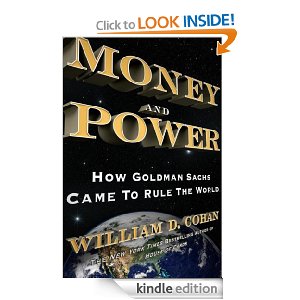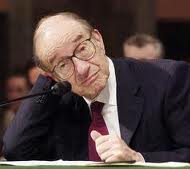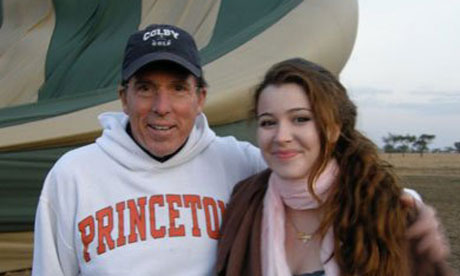The book cover – featuring a view of planet Earth presumably from a heavenly vantage point – offers the first hint that William D. Cohan’s plan here is not critical thinking but rather hyperbolic imagery. Inside he writes a survey not of Goldman, Sachs & Co.’s overall history but rather of historical points selected for potential embarrassment to the firm.
As the consensus choice for the Wall Street firm that escaped the least scathed financially from the credit crunch, paradoxically, Goldman Sachs’ reputation became the most tarnished by its role throughout the 2007/2009 crisis and the years leading up to it. After a calamity like the Great Credit Crunch, the general public and its commentators need a villain. And it stands to reason, goes their thinking, that the Wall Street folks who broke even or came out ahead must have been the same ones who both caused the crisis and set themselves up ahead of time to benefit from it.
Cohan and his publisher clearly sought to benefit from this demand for a scapegoat. Unfortunately Cohan seems determined to find a scapegoat more than he tries to put recent financial events into context that helps explain them.
If you’re looking to save time, skip to the final quarter of the book. Cohan features Goldman’s mortgage department traders and some of their most successful trades in 2007 and 2008. Cohan managed to get Josh Birnbaum, a key part of Goldman’s ‘Big Short’ trading team throughout 2007, to speak on the record and in depth about who did what, when, and to whom. Now, it should be acknowledged here that Michael Lewis’ book about this period and the traders who got the The Big Short right is about five times more interesting than Money and Power, but crucially Lewis could not get Goldman’s employees to speak to him. Lewis settled for a Deutche Bank trader and other more obscure hedge fund traders. Cohan gets the journalistic prize of landing the insiders of Goldman, the firm that the public cares the most about.
The first three-quarters of Money and Power, however, did not need to be written, and certainly don’t have to be read. The majority of Money and Power follows the rise and reign of Goldman’s leaders throughout its history. He clearly interviewed a wide number of leaders and partners of the firm. Less impressively, a majority of his chapters rely almost entirely on secondary sources such as earlier books, newspaper coverage of scandals, and feature pieces in industry magazines. Lawsuits and SEC investigations provide the rare primary source document.
Cohan highlights a few gossipy items of interest, in particular clashes between the firm’s leaders throughout the years. Given the recent collapse of MF Global, Jon Corzine’s massive risk appetite and his trading losses in 1994 seem particularly relevant. Also relevant is Corzine’s long-time alliance with Chris Flowers, who installed him as head of MF Global, and earlier became an uncomfortable catalyst of conflict between Goldman’s leaders Corzine and Hank Paulson in the lead-up to the firm’s IPO in 1999.
Paulson clearly provided extraordinary access to Cohan and manages to come out looking the best among Goldman’s modern leaders, a trick Paulson also pulled off with journalist Andrew Ross Sorkin in Too Big to Fail.
If you need an illustration of how Cohan chose headlines over substance, look no further than his Prologue.
The Prologue describes in detail Senator Carl Levin’s (D-Michigan) cross-examination of executives in the Goldman mortgage department in front of his investigatory committee in 2010. The hearing highlights Levin’s blustering unwillingness to listen to the testimony he’s asking for. Levin repeatedly cuts off answers, refuses to acknowledge complexity, and grandstands for the cable news networks.
As Cohan tells it, Levin makes the point at the end of his Congressional cross-examination that as a lawyer, Levin knows not to represent both sides of a deal. To do so, Levin lectures, would introduce undeniable conflicts of interest that would harm his client, his firm’s reputation, and the ethics of law practice. Levin points out that as a broker working both sides of a CDO transaction, Goldman has badly served its clients and wrapped itself in a web rife with conflicts of interest.
It’s a fine-sounding point, and we can imagine a number of cable news hosts at the time pursing their lips in prim agreement with the venerable Senator’s analogy.
Levin clearly doesn’t get, however, or will not admit to getting, what a broker-dealer does all day. By definition, a financial broker-client relationship is not an attorney-client relationship. Attorneys always, or most properly, represent one side of a deal, but financial brokers do not. There are almost always two sides to the client transaction, and the broker buys from one client and sells to the other client. Cohan should know this, as does anyone who has ever worked in the securities business, but he doesn’t bother to point out the obvious flaw in Levin’s analogy.
Next Cohan describes the SEC actions against Goldman’s CDO structuring desk, built on the evidence of a pair of emails, one from a senior manager who describes relief at the end of a ‘a shitty deal’- and the other in which a relatively junior CDO structurer worries to his girlfriend about the end of a financial window for selling his product. The ‘smoking gun’ found by the SEC was only an empty water pistol, but that did not stop Cohan from describing the actions as if they are solid evidence of wrong-doing and moral breakdown.
Cohan concludes his Prologue with what’s meant to be a shocker about selling shares in Facebook in 2011. For this, Cohan needs to be quoted in full:
“How could Goldman get comfortable, in January 2011, with offering its wealthy clients as much as $1.5 billion in illiquid stock of the privately held social-networking company Facebook – valued for the purpose at $50 billion – while at the same time telling them it might sell, or hedge, at any time its own $375 million stake without telling them that its own private-equity fund manager, Richard A. Friedman, had rejected the potential investment as too risky for the fund’s investors?”
Now here again, Cohan could prove that he knows how broker-dealers work – but he fails to give the obvious answers to his rhetorical question. First, the investment management arms of broker-dealers do not always, or even often, purchase the same investments as their clients. Second, broker-dealers frequently have widely different valuations for assets than their clients. Third, Goldman’s wealthy clients are allowed to, and often do, make purchases that differ, in important ways, from the purchases made by Richard A. Friedman for the firm.
I get the sense that Cohan did a Google search of Goldman just before sending his final book edits to his publisher in early 2011 and decided on one final zinger against the firm. He should have restrained himself. The Facebook example is the point where Cohan loses credibility as a financial journalist and becomes an author trying to capitalize on public anger by ignoring his own experience. It’s too bad for Cohan that the point occurs in the Prologue.
How did Goldman Sachs come to “rule the world?” It’s a great question, and a book that answered it would be a great book to read. Unfortunately, Cohan provides almost no analysis to support his title. Instead he presents Goldman’s history since at least 1929 as a series of scandals, bad behavior, and influence-peddling.
Is Goldman Sachs the real villain of the Credit Crunch? Cohan effectively surveyed the popular mood and surfed the firm’s history for anecdotes to support this idea. But there’s almost no comparative discussion in the book of Goldman’s role vs. the role of other Wall Street firms. There’s also very little in the way of weighing evidence for Goldman’s centrality to the crisis vs. other important actors or explanations. What we are left with instead is a survey of headlines throughout the firm’s history, and an unwillingness to explain what they mean. The intelligent but non-insider audience will believe whatever they believed before picking up the book, and that’s a missed opportunity.
We need a book that leads the interested public through the complex issue of who is responsible for the Great Credit Crunch and the Great Recession, but Cohan’s Money and Power is not it.
Please see related post: All Bankers Anonymous Book Reviews in one place.
Post read (4885) times.










